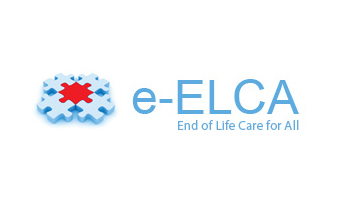As the new clinical lead for the elearning programme End of Life Care for All (e-ELCA) I am excited about being involved in the programme, helping to shape its future and to tell even more people about this fantastic resource.
e-ELCA is a palliative care elearning resource developed in partnership with and hosted on the Health Education England elearning for healthcare (elfh) platform. e-ELCA is relevant to all professionals involved in delivering end of life care. It covers a range of pertinent themes, from clinical topics including symptom control, to communication skills and spiritual care.
The programme was initially developed as a response to the End of Life Care Strategy between 2009 and 2011, as a collaboration between elfh and the Association for Palliative Medicine (APM). Since this time the number of sessions has grown and the programme currently has 160 sessions across nine modules. All sessions are subject to a rolling review to ensure they are contemporary. A significant update to many sessions was carried out following the publication of the One Chance to Get it Right Report in 2014.
Of note, e-ELCA is easily accessible and free of charge to all relevant users in health and social care. The programme can be accessed at http://www.e-lfh.org.uk/programmes/end-of-life-care. It can also be accessed via OpenAthens and the Electronic Staff Record (ESR). Updates about the elearning programme are also broadcast via Twitter using this handle: @cmf_elca
The programme was initially designed to support education of generalists in palliative care. Whilst some sessions therefore may not build on the knowledge of specialty trainees in palliative medicine, they can be used effectively in teaching. e-ELCA sessions have shown to be particularly effective as part of ‘blended learning’. For example, following some recent teaching on body image and sexuality in palliative care with a group of medical students, I directed them to session 3.28 (“I’m not loveable anymore” – discussing intimacy in end of life care) to drive home the learning on a topic they were previously unfamiliar with. Sessions could also be used to build on learning from case studies, and to help students identify future learning objectives.
More recently, a module on specialist content has been developed. Sessions within this include intrathecal drug delivery and tracheostomy care; very useful learning materials that can be used alongside directly-observed procedural skills (DOPS) on the specialist palliative medicine curriculum. Further sessions in this module include heart failure in end of life care and non-invasive ventilation in motor neurone disease. Additionally, we are currently mapping the specialist palliative medicine curriculum to e-ELCA to identify which sessions could be used towards which competencies. When this work is complete I will ensure it is quickly distributed.
Many thanks for reading this. If you have queries please contact me at richard.kitchen@nhs.net or via Twitter – @cmf_elca
Rich Kitchen, APM e-ELCA lead



Comments are closed.